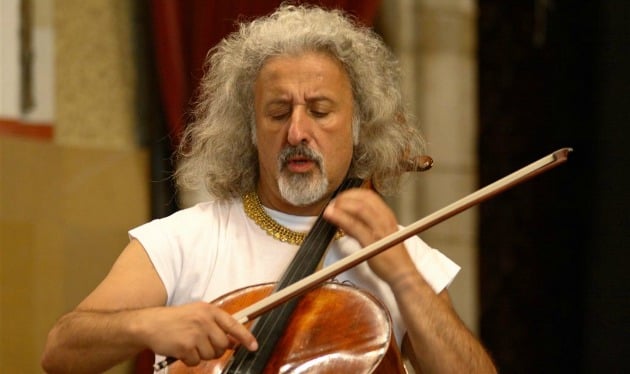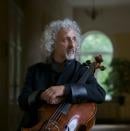
Mischa Maisky’s reputation as an internationally touring soloist, chamber player, and festival winner long precedes what will be his debut San Francisco recital, at Herbst Theater next Monday. But the 68-year-old cellist also lays claim to “a talent for making a long story even longer, as opposed to those people who make long stories short”. He displayed this narrative talent to fine effect in an interview with SFCV from his home in Belgium, in the process discussing family, musical training, good fortune, and the symbiotic role of heart and vibrato in his sometimes controversial performance style.
I’m catching you at home. Where are you exactly?
Just outside Brussels, in Waterloo, to be precise. Where Napoleon had some major problems 200 years ago.
Has this Sunday been peaceful so far for you?
I spent most of it with my boys. I have six children: Two are officially adults, and I play with both of them. With [pianist] Lily, I will be in San Francisco. Her younger brother Sascha is a violinist; we played the day-before-yesterday in Istanbul. I also have an 11-year-old, six-year-old, and three-year-old boys, and a one-year-old daughter.
Is she performing?
[Chuckles] Mila Elina is already singing.
This is publicized as your debut San Francisco recital.
I’m pretty sure that’s correct, and I think it might be Lily’s first visit ever, so she’s coming earlier than me, to enjoy that beautiful city of yours. I’ll be playing in Toronto just before, all the Bach Suites, in one day.
You’ve traveled much, and you’ve lived in Latvia, Russia, Israel, and now Belgium.
And I’m going in June to Japan, for the 45th time. Being musicians, we are very privileged, because it allows us to communicate through music with people from very different cultures.
What about the closest kind of musical communication, with your family?
I’ve been lucky to have played with some of the greatest pianists, including Margaret Argerich (we celebrated last year 40 years of friendship) and Radu Lupu and Peter Serkin and Nelson Freire, and many others. But to play with my own daughter, Lily, or with my son Sascha in a trio, is something I can’t describe in words. With Lily in particular, we have such a natural connection, we never have to discuss much.
Is her feeling for music like yours?
She grew up with my performances and recordings, and she claims she was very much influenced by me, more than any of her teachers.
You grew up and started your own training in Riga, the capital of Latvia. Was that a good place for music?
It was traditionally a cultivated country with a strong European cultural connection. Composers like Wagner and Richard Strauss had come to conduct their music there. The conservatory and music schools were of a high standard, and the proof is the wonderful musicians who have come from there, including Gideon Kremer, Mariss Jansons, and Andris Nelsons. And not only musicians, but ballet dancers, like Mikhail Baryshnikov, with whom I sat at the same desk, as a child. And Kremer was a year older than me. We’ve all been friends ever since.
Was there anything particularly communistic about your education back then?
Obviously, it didn’t matter how wealthy your parents were, because nobody was wealthy. [Chuckles] And there were high standards. That was the good part of the system.
How was it that the bad part landed you in a labor camp?
I never wanted to make publicity out of this incident. But it happened in the summer of 1970, after my sister left the Soviet Union, emigrated to Israel with her family. The authorities were suspicious I would follow her. Since I’d won [sixth place in] the Tchaikovsky Competition, and was a favorite student of Rostropovich, they couldn’t just kick me out [of the Moscow Conservatory], but if they found a way of arresting me, I was automatically out of the Conservatory.
What was the charge?
As opposed to people who have the talent of making a long story short, I have talent of making a long story even longer. But — I was recording my lessons with Rostropovich, but after three years, my tape recorder was in bad condition, and it was not possible to buy a new one in a normal shop. Someone offered me a certificate which only people who went abroad, or foreigners, could use in exchange for currency in special shops. It looked like Monopoly money. So I went to a shop and bought a recorder, and was arrested on the spot, because I was not supposed to use the certificate. All this had been arranged. I spent 18 months in jail, and then 14 months shoveling cement, so I always sarcastically say I was “building communism.”
When I got out, in January of 1972, if I had applied for immigration I would most likely have been taken into military service, three years of another kind of jail. So I managed through friends to meet an influential psychiatrist, and I spent two months in a mental hospital doing meditation and learning yoga, which was not bad at all. I wasn’t with lunatics.
You could find them later, in your musical career.
Absolutely! [Laughs]
Something over a year later, you were gifted with a special cello.
I made my debut at Carnegie Hall, and a gentleman met me backstage whose uncle had been an amateur cellist with a beautiful cello he couldn’t play anymore. He was 94, in a wheelchair, and partly paralyzed. I played for him for several hours, and when we spoke he had tears down his cheeks from happiness, saying now he could die peacefully. He offered it to me at a very symbolic price. I was in love with this cello from the first sight of her sound.
What was it about her?
This cello was made by Domenico Montagnana in Venezia in 1720, which by interesting coincidence was exactly the year Bach wrote his Cello Suites. When people talk about playing Bach on ‘period instruments’, I say, it doesn’t get more ‘period’ than this! I know there are instruments that are better than mine, but for me, there is a saying, perfection is the enemy of good. Montagnana was incredibly consistent. I am very happy with what I have. I’m lucky, because this cello is quite stable and doesn’t give me much trouble.
I always say I am the luckiest cellist in the world, for many different reasons, among them that I am the only cellist to have studied with both Rostropovich and Piatigorsky, and that I met Pablo Casals on the 18th of August 1973, two months before he passed away.
Did Casals say anything to you about your playing?
He was in a good mood; he was almost 97. [Maisky was 25 at the time.] I played for him the complete Bach Suite No. 2, with all the repeats, and the Bach Sonata; my brother [keyboardist Valery Maisky] accompanied me. Casals’ remark about my Bach first made me rather depressed. He said [imitating Casals’ slow trembling voice]: “Oh, young man, what you are playing has nothing to do with Bach.” I felt suicidal. But then he continued: “But — you seem to be so convinced, so it sounds very convincing!” Isaac Stern, who invited me to lunch afterwards, said that’s the greatest compliment a young cellist could get from Casals, that he found it convincing.
We should talk about your longer relationships with Rostropovich and Piatigorsky. Can you compare and contrast?
To say which one was a better teacher would be as silly as to say that Mozart was a better composer than Bach. Obviously they were different by personality. But they both belonged to the same kind of old Russian School, and they knew each other very well. They had a similar approach, different from ‘normal’ teachers, because they hardly ever spoke about how to hold the bow, or fingerings. Their idea was to help a young musician figure out in his mind the results he wants to achieve, and that the instrument is only what the word implies, a vehicle which helps us achieve the ultimate goal, which is music. I think it’s important to develop your musical tastes, with your hands following your mind, and not the other way around. So I can practice being on the plane, sitting in the car, studying scores, or reading about music.
Maybe even while you’re doing interviews.
Yes, absolutely! [Chuckles] Even in my sleep, I dream some music very often.
Alain Matalon, who writes for the Bachtrack website wrote of your playing, “His vibrato is excessive, but it never gets in the way of the music.” Which seems to beg a bunch of questions.
I know I’m sometimes accused for this and other things. And I’m genuinely the kind of musician who tends to exaggerate a lot of things. Because I don’t play on stage for connoisseurs . . . I think of people who are listening to this music for the first time in their lives, to help them to discover and notice and appreciate. I prefer to do too much than to do too little, and I hope people will enjoy.
And your way works with Bach.
The great German conductor Otto Klemperer, who conducted a lot of Bach, was told, at the end of his life, “Maestro, they discovered Bach played with no vibrato”. And he responded, “Huh? Twenty children, and no vibrato?” Casals said that there’s no emotion which is not in the music of Bach. It’s just a question of being able to dig deep enough to discover it and to express it.
As a performer, your vibrato seems a vital part of your expression.
I always say that I, by far, am not the cleanest cello player around, I could play more precise. But the sacrifice would be certain expressive and emotional elements that reach the heart, and that’s my goal. And in order to reach people’s hearts, it has to originate from your heart, and you have to do it with love.
Which need not be restricted to the Romantic repertoire.
Vladimir Horowitz said that, for him, all music is romantic.
Was the choice of the program for your Herbst recital yours?
Yes and no. Bruch was a particular request from some of the sponsors, I play it more with orchestras, but it’s okay. It’s a rather varied program. Britten is one of my favorite composers, one of the most romantic from the 20th Century. Piazzolla is a relatively new piece for us. There will be two major sonatas, and a couple of shorter pieces, and it leaves times for encores, if people would like. I have one rule: I never play any music that I don’t like enough to be in love with at the moment I play it.
I wonder if people will come expecting you to be a bit wild.
If people are seeking technical perfection, they are much better off staying at home with professional recordings, which are edited. I take a lot of risks and chances, and I hope people prefer the result to sterile frozen food presentations.

